2024 Hyundai IONIQ 5 N vs Tesla Model Y vs Ford Mustang Mach-E GT comparison review

There’s nothing more thrilling than an EV that allows you to feel all the instant torque and power on offer from an electric drivetrain.
Hyundai’s IONIQ 5 N will do just that, taking on two other high-performance EVs: the market-leading Tesla Model Y in its Performance format, released in January 2023, as well as the recently arrived challenger: the Ford Mustang Mach-E GT.
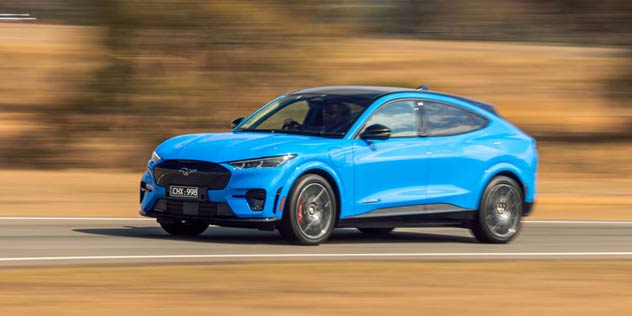 The Ford Mustang Mach-e
The Ford Mustang Mach-eAll offer acceleration from a standing start to 100km/hr in under 4 seconds, thanks to neck-jolting power output and torque figures, and a slew of high-performance racing specs and capabilities.
But which reigns supreme in key categories: the Hyundai IONIQ 5 N, the Tesla Model Y Performance, or the Ford Mustang Mach-E?
IONIQ 5 N, Model Y Performance, Mustang Mach-E GT pricing and specifications
Price point: At $91,400 before on-road costs, the Tesla Model Y Performance offers the most competitive pricing of the three by a long shot.
The Ford Mustang Mach-E and Hyundai IONIQ 5 N add an extra $17-20,000 on the sticker price, sitting at $108,990 and $111,000 respectively before on-road costs.
Drive, battery, and range: Tesla Model Y Performance takes the lead with a 514km WLTP range, powered by an 82kWh battery. Boasting a low drag co-efficient of 0.23 (its rivals achieve 0.28-0.29), it makes best use of its power.
The Ford Mustang Mach-E trails slightly with a 490 km range, despite having a larger 91 kWh battery. The Hyundai IONIQ 5 N has a nominal range (prior to its local launch) of 450 km range from its 84kWh battery.
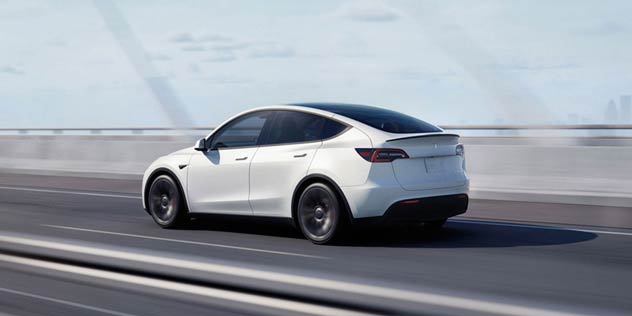 The Tesla Model Y
The Tesla Model YCharging: Tesla again leads with a max DC charge rate of 250 kW, outpacing Hyundai's 233 kW and Ford's 150 kW. The top charge rate for the Model Y Performance variant is 50 per cent faster than the RWD variant, making it the best in class in this comparison.
Hyundai says its IONIQ 5 N, like other of its EV models built on the 800-volt e-GMP platform, can charge from 10-80 per cent in 18 minutes on an ultra-fast-charger.
Considering the Mustang Mach-E has the largest battery of the three, its lower top charge rate is somewhat disappointing. All three, however, share a similar 11 kW AC charge rate.
Power and performance: Hyundai IONIQ 5 N impresses with 448 kW power and a 0-100km/hr sprint in just 3.4 seconds. Tesla's 413 kW and Ford's 358 kW are formidable but slightly less punchy. However, Tesla's top speed of 250km/hr is just a tad lower than Hyundai's 260km/hr.
Specifications comparison table
| Make/Model | Hyundai IONIQ 5* | Tesla Model Y | Ford Mustang Mach-E |
|---|---|---|---|
| Variant | N | Performance | AWD GT |
| Price | $111,000 | $91,400 | $108,990 |
| Battery (kWh) | 84 | 82 | 91 |
| Drive | AWD | AWD | AWD |
| WLTP Range (km) | 450 | 514 | 490 |
| Drag coefficient | 0.29 | 0.23 | 0.28 |
| GVM (kg) | 2660 | 2532 | 2717 |
| Power Output (kW) | 478 | 413 | 358 |
| Torque (Nm) | 740 (770 Boost) | 660 | 860 |
| Acceleration (secs, 0- 100) |
3.4 (Boost) | 3.7 | 3.7 |
| Top Speed (km/hr) | 260 | 250 | 200 |
| Plug Types (AC/DC) | Type 2/CCS2 | Type 2/CCS2 | Type 2/CCS2 |
| Max Charge Rate (AC/DC) |
11/233 | 11/250 | 11/150 |
| Length (mm) | 4715 | 4751 | 4743 |
| Width (mm) | 1940 | 1921 | 1881 |
| Height (mm) | 1585 | 1624 | 1613 |
| Running Clearance | 160 | 167 | 163 |
| Wheelbase | 3000 | 2890 | 2348 |
| Tow Rating (braked/ unbraked) |
750/750 | 750/1600 | 0/0 |
IONIQ 5 N, Model Y Performance, Mustang Mach-E GT driving features
With all three billed as high-performance electric vehicles, it’s no surprise that each has features aimed at unleashing maximum performance.
Two – the Model Y and the IONIQ 5 N – have specialised track modes which are designed for letting loose on closed circuit tracks.
Tesla’s Track Mode helps drivers monitor battery temperature, and other key factors like handling, stability and post-drive cooling. It also shows a “G-Meter" which displays “peak lateral, acceleration, and deceleration values.”
Hyundai’s racetrack capability includes torque distribution, a “drift optimiser”, a 10-second power boost, launch control, virtual gear shift, and battery pre-conditioning for an optimal drag racing experience.
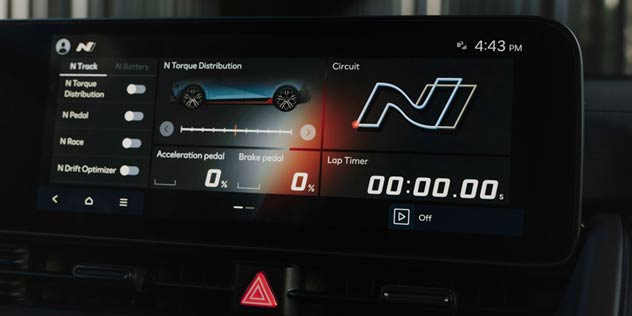 The Hyundai Ioniq 5 N track mode screen
The Hyundai Ioniq 5 N track mode screen The Mustang Mach-E's “Untame Plus” mode which can sustain higher power for longer periods, was tested by Open Road’s Adam Smith who described it as “exhilarating.”
However, while it includes virtual gear changing, special orange ambient lighting and fake engine sounds, there do not appear to be specific track mode capabilities.
Performance features comparison table
| Make/Model | Hyundai IONIQ 5* | Tesla Model Y | Ford Mustang Mach-E |
|---|---|---|---|
| Variant | N | Performance | AWD GT |
| One Pedal Driving | Yes | Yes | Yes |
| Wheel Size | 21-inch forged | 21-inch Überturbine | 20-inch alloys |
| Brake Type | Performance Brakes | Performance Brakes | High-performance Brembo Brakes |
| Racetrack Capability | Racetrack with N Grin Boost, N Pedal and N Drift Optimiser | Track Mode | “Unbridled Extend” Driving Mode |
| Suspension | Electronically Controlled Suspension | Performance Suspension | MagneRide® adaptive suspension |
IONIQ 5 N, Model Y Performance, Mustang Mach-E GT connectivity
The Ford Mustang Mach-E and Tesla Model Y Performance offer larger touchscreens compared to the Hyundai IONIQ 5 N, with the Mach-E offering a vertical touchscreen rather than landscape format.
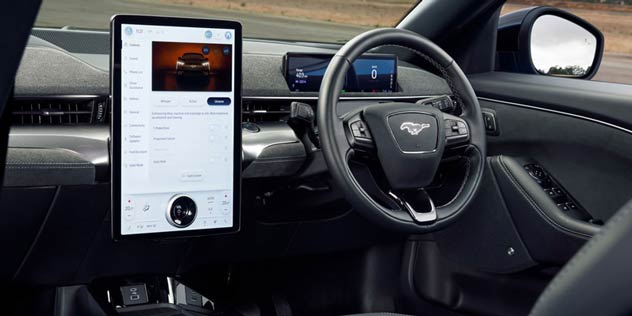 The Mustang Mach-e dashboard
The Mustang Mach-e dashboardHowever, while both the IONIQ 5 N and Mustang Mach-E have an additional digital instrument cluster behind the steering wheel, the Model Y relies solely on the one touchscreen to the left of the steering wheel – a consideration for those wanting that extra visual display.
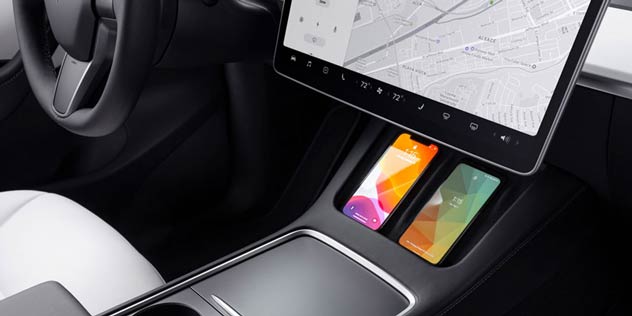 The Tesla Model Y console
The Tesla Model Y consoleThe IONIQ 5 N and Mustang Mach-E also support Apple CarPlay and Android Auto, while the Tesla Model Y Performance offers a built-in app experience that includes Spotify and other streaming services, YouTube, a browser, “Caraoke” and a plethora of fun games.
While all official IONIQ 5 N specs are not yet available, images of the overseas IONIQ 5 N on Hyundai’s Australian website show two USB-C ports* in the front.
The Mustang Mach-E offers both USB-C and USB-A ports, the Tesla Model Y Performance offers the most USB-C ports, which may be a consideration for tech-savvy users or families with multiple devices.
Connectivity features comparison table
| Make/Model | Hyundai IONIQ 5* | Tesla Model Y | Ford Mustang Mach-E |
|---|---|---|---|
| Variant | N | Performance | AWD GT |
| Touchscreen Size | 12.3-inch touchscreen and 12.3-inch instrument cluster | 15-inch touchscreen | 15.5-inch touchscreen and 10.2-inch instrument cluster |
| Infotainment System | High-Resolution Touchscreen | High-Resolution Touchscreen | SYNC 4A with Touchscreen |
| Connectivity and Music | Hyundai Bluelink™, Apple CarPlay, Android Auto | Tesla App, Built-in Streaming Apps | FordPass Connect, Apple CarPlay, Android Auto |
| USB Ports | 4 USB-A* (Front and Rear) | 4 USB-C (Front and Rear) | 2 USB-C, 2 USB-A (Front and Rear) |
| Wireless Charging | Yes | Yes | Yes |
| Roof | Panoramic Sunroof (optional) | Panoramic Fixed-Glass Roof | Panoramic Fixed-Glass Roof |
| Additional Electronic Enhancements |
Heads-Up Display (HUD) | Premium Sound System, HEPA Air Filtration | B&O Sound System |
| Additional Features | V2L Capability, Solar Roof (optional) | Premium Interior, Heated Seats | Hands-Free Tailgate, Heated Front Seats |
IONIQ 5 N, Model Y Performance, Mustang Mach-E GT safety features
All three vehicles bring a strong focus on safety, with the Tesla Model Y getting a five-star rating from ANCAP. When it was tested in late 2022, it achieved a record score for Safety Assist (98 per cent), and the highest adult occupant protection rating under for ANCAP’s 2020-2022 criteria.
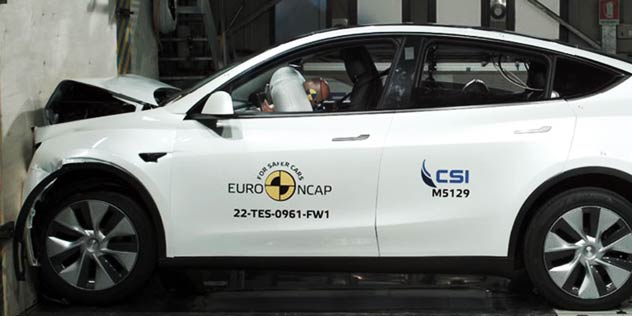 The Tesla Model Y undergoing Euro NCAP crash tests
The Tesla Model Y undergoing Euro NCAP crash testsOn the other hand, the IONIQ 5 N and Mustang Mach-E GT both are excluded from the five-star ratings for their model range. Nevertheless, their lower-specced variants scored five stars and include the same safety features listed below.
Safety features comparison table
| Make/Model | Hyundai IONIQ 5* | Tesla Model Y | Ford Mustang Mach-E |
|---|---|---|---|
| Variant | N | Performance | AWD GT |
| ANCAP rating | N/A | Five stars | N/A |
| Advanced Safety Features | Blind-Spot View Monitor, Driver Attention Warning, Forward Collision Avoidance, High Beam Assist, Advanced Rear Occupant Alert, Safe Exit Assist, and Surround View Monitor | Sentry Mode, Automatic Emergency Braking, Collision Avoidance Assist, Blind Spot Monitoring, Lane Departure Avoidance, Obstacle Aware Acceleration, Side Collision Warning, Electronic Stability and Traction Control, Post-Collision Braking | Evasive Steer Assist, Post Impact Braking, Blind Spot Monitoring with Cross Traffic Alert and Braking, Emergency Brake Light, Rear View Camera, 360 Degree Camera, Reverse Brake Assist |
| Driving Assistance | Lane Following Assist, Lane Keeping Assist – Line/Road-Edge | Autosteer and Traffic-Aware Cruise Control (Autopilot), Full Self-Driving (FSD) Capability (optional), Speed Sign Recognition and Alert | Intelligent Adaptive Cruise Control, Enhanced Active Park Assist, Speed Sign Recognition |
| Parking Assist Features | Rear Parking Sensors, Rear View Camera, Remote Smart Parking Assist System, Parking Assist | Parking Assist, Autopark (with FSD), Rear View Camera | Active Park Assist 2.0, Front and Rear Parking Sensors |
| Warranty | Five years/Unlimited km | Four years/80,000km | Five years |
| Battery Warranty | Eight years/160,000km | Eight years/160,000km | Eight years/160,000km |
What’s the verdict?
If price is no barrier and you're after a wide range of track capabilities - and the added bonus of vehicle-to-load capabiltiies - then the IONIQ 5 N is for you.
If your main consideration is price, plus a nifty track mode and you're not fussed about the ability to use Apple CarPlay or Android Auto then Tesla Model Y wins hands down.
It also scores top points for longest range, fastest charging time, a 1.6 tonne towing capacity and a full five stars under the ANCAP safety ratings.
On the other hand, if you love all the machismo offered by the Ford Mustang DNA plus it virtual engine sounds and just need an "Untamed" energy boost, then the Mach-E will be right up your alley.


